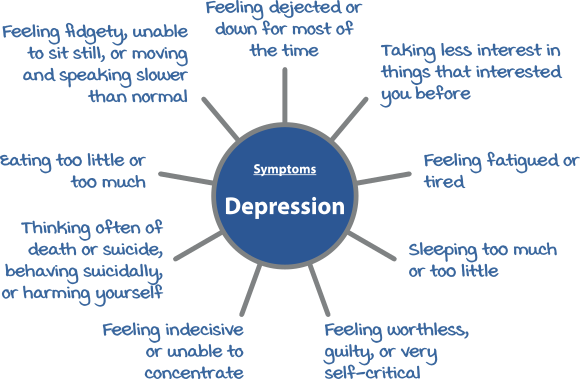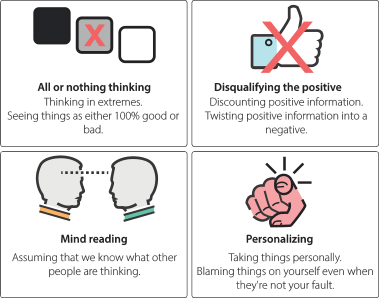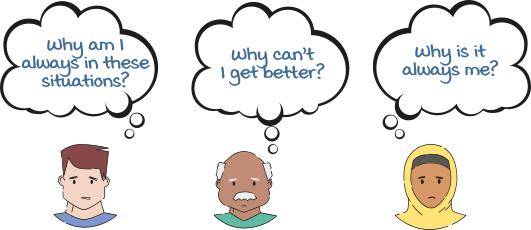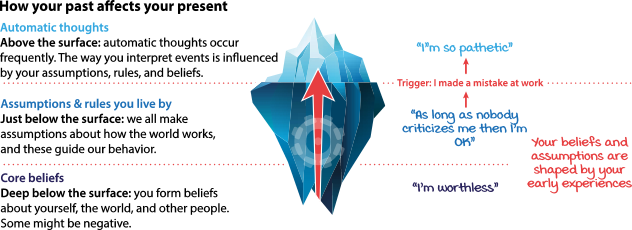Understanding Depression
This guide will help you to understand, what depression is, why depression might not get better on its own, Treatments for depression
Everyone feels ‘down’ from time to time, but depression is more than that. When you are depressed your low mood can last for weeks at a time. While mild depression might not stop you from living your life, severe depression can make you feel suicidal and unable to function normally. It is thought that between 3 and 7 people out of every 100 will experience depression every year. The good news is that there are many effective psychological and medical treatments for depression.
What is depression?
If you are depressed, you may have low moods for long periods of time. Common symptoms
of depression include:

Some people have an episode of depression once and recover, other people have many episodes of depression throughout their life. Further episodes can be more easily triggered if you have had depression before. We can separate the effects of depression into what you might think, what you might feel, and how you might act
What is it like to have depression?
People who suffer from depression often find that their negative thoughts and mood interfere with their work and social life. Tanya and Rashid’s stories show what it can be like:
Tanya’s depression
I was thirty-four when I first decided to see a therapist. My relationship with Phil had ended after four years, even after I had moved cities to be with him. I had been feeling unhappy before the breakup, but after it happened I was devastated, and things just got worse over the next year. Sometimes I felt so sad that I just couldn’t stop crying, and other times I would feel hollow and empty.
When I spoke to friends on the phone they would reassure me that things would pick up, but it didn’t happen. I used to be quite an active and hopeful person, but now I was struggling to motivate myself. I took a lot of time off sick from work because I couldn’t face it, and when I was there I couldn’t concentrate. I worried that my manager would get rid of me, but I couldn’t summon the motivation to do anything about it.
I stayed home whenever I could and didn’t want to see anyone. I couldn’t get enthused about anything, couldn’t be bothered to cook properly, and wasn’t doing anything I enjoyed because nothing seemed worth doing. I would often wake during the night and find myself thinking over all the things that had gone wrong in my life and wondering why they happened. I felt completely hopeless about the future, and was sure that the breakup meant that I would never have children. Sometimes I would hear my mother’s voice in my head saying “You’ll never make a success of your life.”
Rashid’s depression
“Looking back now, I think I had been depressed on and off since I was a teenager. I grew up in a poor neighborhood and went to a bad school where the teachers didn’t care. When I was younger I never really felt like I fitted in – I hung about with some people but didn’t really have any close friends. My Grandmother cared about me, but she died when I was thirteen, and I didn’t have anyone special after that. After I left school, I moved out and got a job in sales. I didn’t enjoy it much but some other people I went to school with were unemployed, so I told myself I was lucky.
I was diagnosed with diabetes and would get really tired sometimes: my doctor told me to take better care of myself and eat better, but I didn’t really care enough to take her seriously. My mind worked strangely. I was tired all the time, and I don’t remember ever really feeling happy, but at the same time my brain was always busy. I would always be thinking about things that I’d failed at, or things that had gone wrong, never anything positive.
I knew I wanted to be happy, but I didn’t know how. I would think “Is this how life is supposed to be?”. I felt really churned up – like I knew something was supposed to be different, but I didn’t know what it was. When it was really bad, I would think a lot about dying. I thought about how I might end my life and even stockpiled my medication. I used to drink too much, and sometimes if I had a headache I would take too many painkillers because I didn’t really care.
Looking back on it now, I think I was lucky to survive some of the things I did. When it was at its worst, I wouldn’t leave my apartment unless I had to. Sometimes I played videogames, but other times I wouldn’t even have the motivation to do that. I think I slept a lot during the day so that I wouldn’t have to face anything, and then I would be awake at odd times which could make the nights feel really long.”
What keeps depression going?
Cognitive Behavioral Therapy (CBT) is a popular evidence-based psychological therapy. CBT therapists work a bit like firefighters: while the fire is burning they’re not so interested in what caused it, but are more focused on what is keeping it going, and what they can do to put it out. This is because by working out what keeps a problem going, they can treat the problem by ‘removing the fuel’ and interrupting this maintenance cycle. CBT proposes that the reason why some people’s depression doesn’t get better by itself is because they are struggling with a mixture of interpreting things in unhelpful ways and acting in ways that are self-defeating. CBT has a lot to say about why depression might
not get better by itself, but some of the most important reasons are to do with:
- What you do when you feel unmotivated
- Unhelpful thinking habits
- Using rumination and worry as ways of trying to solve your problems
- Your past, your beliefs, and assumptions
What you do when you feel unmotivated
Psychologists have found that there is a strong relationship between what you do and how you feel. When you are feeling good, you are more likely to spend time with people whose company you enjoy, get involved in activities that make you feel good, and take on new tasks and adventures that challenge you as a person. Living a life full of this kind of activity has positive feedback effects:
- Doing things you enjoy gives you feelings of pleasure.
- Challenging yourself means that you have a chance to grow and develop. It gives you a sense of mastery and achievement.
- Having positive relationships with other people makes you feel connected and valued.
The reverse is true too. When you are depressed you are likely to do less overall, and so you have fewer opportunities to feel pleasure, mastery, achievement, and connection – things you need to feel good. It is easy to fall into a trap:
The slow way out of this trap is to wait until your depression just goes away (and it does for some people). There are two big problems with this slow approach: it can leave you feeling helpless (because you are at the mercy of something out of your control), and you are likely
to be waiting for a long time – the average episode of depression can last between three and eight months.
The quicker way out of this vicious cycle is to increase your level of activity, even if you don’t feel like it to begin with. This approach is called behavioral activation (BA) and it is a psychological treatment for depression, with scientific research showing that it works. It is designed to help you to reconnect to what matters to you, and to help you have rewarding things in your life.
Unhelpful thinking habits
As well as paying attention to what you do, another way of understanding depression is to pay attention to what you think. Cognitive therapy is based on the insight that it is not the things that happen to us that make us feel good or bad, but rather the way that we interpret them – the meaning that we give to them – that guides how we feel. This explains why two people experiencing the same event can react to it in completely different ways. Let’s look at an example:

When we are happy our interpretations tend to be optimistic – we can see the bright side even when stressful things happen. Depression can change how you think in important ways. People who are depressed are prone to interpret situations in inaccurate and negative ways which leave them feeling bad. Psychologists call these ‘cognitive biases’ or ‘unhelpful thinking styles’, and common examples include:

Rumination and worry
To ruminate and worry means to repeatedly think, worry about, or be preoccupied by your feelings, current problems, past upsetting events, things about yourself, or the future.
Rumination and worry are common and normal. Everyone does them to some extent – we have all dwelled on our mistakes, breakups, or losses. We do it because sometimes: reflecting on something that went wrong can help us to come up with different ways of thinking or acting, and dwelling on what might happen before a difficult event can help you to plan and prepare for what might happen.
Rumination and worry can become unhelpful though. There is evidence that they can prolong an episode of depression, and people who ruminate a lot are more vulnerable to episodes of depression in the future.

A psychologist called Ed Watkins published an influential theory about why rumination and worry become a problem in depression. He proposed that there are differences in the style of rumination that can lead some people to become depressed and stay depressed:
- Helpful rumination asks more “how … ?” questions. “How … ?” questions focus on solving problems and can lead to practical solutions. Examples of helpful rumination questions include: “How can I get out of this situation?”, “What can I do to make this better?”
- Unhelpful rumination asks more “why … ?” questions. “Why … ?” questions focus on the causes and consequences of a problem. Despite sometimes feeling like they are productive they don’t always guide you towards making any helpful changes in your life. Examples of unhelpful rumination questions include: “Why am I in this situation?”, “What if it never gets better?”, “What did I do to deserve this.”
Unhelpful rumination often falls into certain categories. Do you recognize yourself in any of these?
- You make negative comparisons between yourself and other people. “Why can’t I be more like them?”, “Why do I have these problems when other people breeze through life easily?”
- You make comparisons between how things are and how you want them to be. “Why can’t I be happy?”, “Why can’t I be well?”.
- You make comparisons between how you are now and how you were in the past. “Why can’t I be happy like I was before?”, “Why can’t I be productive like I used to be?”, “Why am I such a failure now?”.
- You use rumination as a kind of avoidance. You spend time thinking about your problems at the expense of actively doing things that might help (but which might be feel uncomfortable).
The good news is that there are psychological treatments that can help you to ruminate in more helpful ways.
Your past, your beliefs, and assumptions
The CBT approach to depression begins with a focus on the here-and-now, because that’s where your depression is. CBT recognizes that the way you feel hasn’t appeared from nowhere: your early life, past experiences, significant experiences, and relationships with other people all have an effect on who you are and how you think and feel.
It isn’t possible to do anything about what has got you to where you are. However, we can explore what sense you have made of your experiences and how they affect your thoughts, feelings, and engagement with the world. Through these experiences we form beliefs and assumptions about ourselves and the world, but they are often hidden or unspoken.

Beliefs, rules and assumptions that are too simple or inflexible might cause you trouble. For example:
- Hayley had the belief “Unless I succeed in all areas of life then I am a failure”. Even the slightest hint of failure would send her spiraling into depression.
- Karol’s parents had favoured her sister as she was growing up, and she had come to believe that she was worthless. She tried hard to make a success of her life, but could never shake the feeling that she didn’t count for anything.
When they are given the space to reflect on them – and test them – many people find that the conclusions that they have drawn about themselves, other people, or the world are overly harsh or threatening. Other times, people might decide that there had been good reasons for coming to those conclusions earlier in their life, but that they have now reached a point where they are no longer useful. Talking therapies like CBT are designed to give you a chance to consider and evaluate your beliefs and assumptions.
Treatments for depression
Psychological treatments for depression
Depression is one of the most extensively-researched emotional problems, and there are many effective psychological treatments. One recent review found that all of the therapies listed below can be effective in the treatment of adult depression:
- Acceptance and Commitment Therapy (ACT)
- Behavioral Activation Therapy (BA)
- Cognitive Behavioral Therapy (CBT)
- Compassion Focused Therapy (CFT)
- Interpersonal psychotherapy (IPT)
- Life-Review Therapy
- Problem-Solving Therapy
- Psychodynamic Therapy
In addition, Mindfulness Based Cognitive Therapy (MBCT) has been shown to prevent relapse in people who have recovered from depression, or who have had three or more episodes of depression.
Do you remember Tanya from earlier? She described her experience of therapy
At first, I found it difficult to commit to psychological therapy, but my counselor was sensitive and caring, so I began to open up. The most helpful parts of therapy were understanding the links between my thoughts, actions, and feelings, as well as learning how rumination affects my mood. My counselor recommended behavioral activation as an initial treatment, and although I found it difficult, it did make a difference to my mood. I found it really helpful to start with simple things like getting out for a walk every day, and then later to find ways to connect with other people by joining some groups.
Later in therapy, I made some important links between some of my early experiences – particularly the way I had been treated by my mother when I was a child – and the harsh way that I speak to myself now. I learned to catch and challenge some of my negative and critical thoughts, and I began to see myself in a new light. I’m in a much better place now.
Rashid found helpful these aspects of treatment helpful
I was really lucky to get therapy through a charity that did work in my community. I was doubtful, but I figured that I didn’t have anything to lose. I think one of the best things about it was that she just encouraged me to talk and I could tell that she really cared about me. The only person I’d ever really had like that in my life was my grandmother.
We talked about the thoughts I had about not wanting to live, and she helped me understand that I was looking for solutions and just wanting to escape from how I was feelings. We developed a plan of what I would do if the thoughts got really bad, but as therapy went on, although I would still get thoughts like that they wouldn’t be as scary or hopeless as before.
Before therapy, I would be really tough on myself. I would call myself a failure, or I would swear at myself and call myself names. My therapist asked if I would ever speak to anyone else like that – whether I would ever say those things to my little brother. I never would, and it made me feel like a hypocrite, so I began to notice when I was starting to do that to myself. We talked about where that critical voice had come from – whether there were many people who spoke to me in kinder ways at school or at home. She thought that might explain why I spoke to myself like that.
She also helped me find things I like. She got me involved in some community projects. It gave me a sense of purpose, and as I got to know some people there, I didn’t want to let them down. I still do some volunteer work with them at weekends – they run projects for kids in some neighborhoods and I’m good at helping them,which makes me feel better.
Medical treatments for depression
The National Institute for Health and Care Excellence (NICE) recommends SSRI-type antidepressant medication for depression. If a person does not respond to SSRIs, other drug classes including tricyclic antidepressants can be considered, and antidepressant treatment can be augmented with lithium or antipsychotic drugs.
8 ways to tackle depression without medication
Read our article on tackling depression without taking medication
Resources for depression
For more resources on helping with depression check out our resources page.
As well is you are struggling with any of the above you can always refer yourself in to are enhanced wellbeing service





